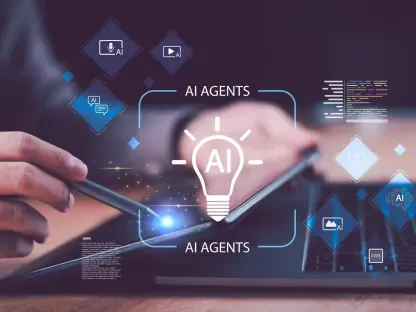Imagine a world where coding is not just about typing lines of code but collaborating with an intelligent partner that anticipates needs, selects the optimal tools, and safeguards a project from unintended errors, transforming the development process. This is no longer a distant vision but a reality unfolding through AI integration in development environments like Visual Studio Code (VS Code). As one of the most widely used code editors globally, VS Code stands at the forefront of this transformation, redefining how developers work. The latest update, version 1.104, released on September 11, 2024, marks a significant milestone in embedding AI into everyday coding workflows. This article explores the trend of AI-driven development, focusing on model flexibility, security in agent interactions, and user experience enhancements, while delving into broader implications for the tech industry.
The Surge of AI-Driven Coding in Development Tools
Adoption Rates and Growth Patterns of AI Features
The integration of AI tools into coding environments has seen remarkable growth, with recent surveys indicating that over 60% of developers now rely on AI assistance for tasks like code completion and debugging. This statistic, drawn from industry reports on developer productivity, underscores a shift toward automation in software development. VS Code 1.104 amplifies this trend by introducing features like automatic model selection through the “Auto” option in the model picker, catering to all GitHub Copilot users. Such advancements reflect a broader movement where platforms prioritize seamless AI integration to boost efficiency.
Beyond adoption rates, the update’s introduction of the LanguageModelChatProviders API allows extensions to incorporate diverse language models, whether local or cloud-hosted. This flexibility signals a maturing ecosystem where developers can tailor AI tools to specific needs, a development echoed in user feedback praising the reduced manual effort. The momentum of AI adoption in VS Code highlights a critical pivot point, positioning the editor as a leader in shaping how developers interact with intelligent systems.
Practical Impacts of AI in Modern Workflows
In practical terms, VS Code 1.104 demonstrates AI’s value through dynamic model selection, choosing high-performing options like Claude Sonnet 4 or GPT-5 based on performance metrics and rate limits. This capability ensures that developers access the best tools for their tasks without constant manual adjustments. Such innovation proves particularly useful in complex projects where varying computational demands require adaptive solutions, showcasing AI’s role in optimizing workflows.
Additionally, specific features like the updated #codebase tool enable semantic code searches with improved accuracy, thanks to a new embeddings model. This allows developers to locate relevant code snippets faster, enhancing productivity. Another notable application is the integration of AGENTS.md files into chat contexts, facilitating team collaboration by providing shared AI agent instructions, a feature widely adopted by distributed development teams.
Real-world examples further illustrate this trend, with communities leveraging extensions built on the new API to address challenges like automated code reviews and error detection. These use cases reveal how AI in VS Code transcends mere convenience, becoming a cornerstone for solving intricate coding problems. The tangible benefits seen across diverse developer groups emphasize the transformative potential of these updates.
Expert Perspectives on AI Integration Dynamics
Industry leaders have lauded the emphasis on AI model flexibility in tools like VS Code, noting that adaptability is crucial for meeting varied developer demands. A senior Microsoft developer recently highlighted that extensibility through APIs ensures that the platform remains relevant amid rapidly evolving AI technologies. This perspective reinforces the importance of creating systems that can integrate emerging models without disrupting existing workflows.
On the security front, experts stress the delicate balance between automation and control, especially in agent mode where autonomous file edits pose risks. The consensus is that VS Code 1.104’s requirement for user confirmation before critical changes addresses a vital concern, preventing unintended modifications. Such measures are seen as essential to maintaining trust in AI tools, with commentators advocating for even stricter protocols as automation capabilities expand.
Looking at productivity and collaboration, thought leaders predict that AI-driven coding could redefine team dynamics by accelerating development cycles and reducing repetitive tasks. However, they also caution against over-reliance, pointing out potential pitfalls like diminished critical thinking if developers lean too heavily on AI suggestions. These insights underscore a dual narrative of opportunity and responsibility, shaping the discourse around AI’s role in development environments.
Long-Term Outlook for AI in Coding Platforms
Looking ahead, AI integration in platforms like VS Code could evolve to offer even more sophisticated model adaptability, potentially incorporating real-time learning to refine suggestions based on project history. Such advancements might enable deeper semantic understanding in code searches, making tools not just reactive but predictive. This trajectory suggests a future where development environments become intuitive partners in the creative process.
The benefits of this trend are substantial, promising faster development cycles and enhanced collaboration through shared AI contexts and automated workflows. Yet, challenges loom, particularly in ensuring robust security as AI autonomy increases. The risk of unauthorized actions or data breaches necessitates ongoing innovation in safeguard mechanisms, a concern likely to dominate discussions in the coming years from 2025 onward.
Broader implications for the tech industry include the potential for other IDEs and coding tools to adopt similar AI integrations, creating a competitive landscape focused on intelligence and usability. This shift could also reshape developer skill requirements, prioritizing familiarity with AI systems alongside traditional coding expertise. As these trends unfold, the industry may witness a redefinition of what it means to be a software developer, blending technical and strategic competencies.
Final Reflections on AI’s Role in Development
Reflecting on the strides made with VS Code 1.104, it is evident that the advancements in AI model selection, agent security protocols, and usability enhancements mark a turning point for developers. These updates provide a blueprint for balancing innovation with safety, ensuring that tools empower users without compromising control. The release stands as a testament to Microsoft’s dedication to evolving alongside the needs of the coding community.
Moving forward, developers are encouraged to dive into these new features, experimenting with automatic model selection and collaborative tools to uncover their full potential. A critical next step involves contributing feedback to refine security measures, ensuring that future iterations address emerging risks. By actively engaging with this evolving landscape, the community can shape AI’s integration into coding, driving progress that is both groundbreaking and grounded in practical needs.









